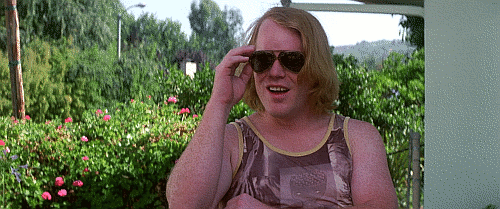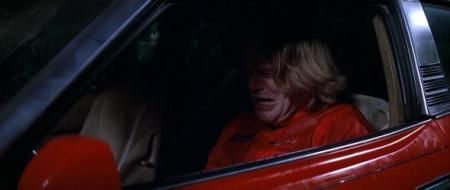Paul Thomas Anderson’s breakout epic about the golden era of porn, Boogie Nights, flirts with the culturally subversive potential of the community on which it focuses. When I recently rewatched the film (having first seen it over a decade ago), the inversion of the male gaze jumped out at me. We do see female bodies in states of undress, meant to arouse, but Dirk Diggler (Mark Wahlberg)– or to be more specific, Dirk’s 13 inch penis– is the sun at the center of Boogie Nights’ universe. Although the audience must wait until the very end of the 2 ½ hour film for the full frontal reveal, Dirk’s penis is very much a presence in the rest of the film. When he whips it out, the camera focuses on the character who is doing the gazing. The audience’s thrill and titillation is vicarious; we are invited to empathize with Rollergirl (Heather Graham), the Colonel (Robert Ridgely), and others as they marvel at Dirk’s cock, instead of to consume depersonalized images of Dirk’s body. Similarly, during Dirk’s debut scene, the sight of him and Amber Waves (Julianne Moore) fucking is distanced from the audience as Jack’s camera is literally put between us and them. The more clearly framed images are those of the cast as they watch Dirk’s performance; Scotty J’s (the dear departed Philip Seymour Hoffman) near-painful desire for Dirk, combined with the discomfort of holding up the boom mike, is of particular note. (More on him in a bit.)

Another aspect of the potential subversiveness of Boogie Nights is the characters’ sexual relationships. The main characters form a family of sorts, headed by Jack Horner (Burt Reynolds) and Amber. Treating each other with support and affection, the members of this family both mimic and exist outside the boundaries of the heterosexual nuclear family. While we don’t see them engaging in kink or sex between characters of the same gender, making sex into an art and a profession is queering, to a degree. Their lifestyles and sexual choices are used as reasons to marginalize them: Buck (Don Cheadle) is denied a business loan, Amber loses custody of her child, and Dirk is queer-bashed while hustling. (One of his attackers calls him “donkey dick,” turning the attribute that made him special in his community into an oddity.) Whereas sex in movies is usually burdened with emotional weight, a cause of strife and jealousy, most of the characters in Boogie Nights are effervescently casual about it. However, we are given a few subplots where characters divert from the free-love culture promoted by Jack and his crew. One is Little Bill’s (William H. Macy) blatant cuckolding by his wife (Nina Hartley), which culminates with him carrying out a murder-suicide; the other is Buck and Jessie (Melora Walters), who are pushed together as wallflowers at Jack’s Christmas party, marry, have a baby, and start a small business, executing so perfectly in line with the American dream that Buck’s commercial for his stereo store is dripping in red, white, and blue. The trajectory of both couples in the film ultimately comes down to the husbands’ agency; both of whom take themselves and their wives out of the industry because they don’t fit in. Little Bill and his wife apparently aren’t able to successfully navigate their relationship through her desire to have sex with other men– the film does not confirm whether or not she performs in Jack’s films, but casting real-life porn legend Nina Hartley in the role certainly implies she does. The implication that Buck is out of place comes through his clothing; he dresses like a cowboy, which customers at his part-time salesman job find off-putting and his co-star Becky (Nicole Ari Parker) tells him is no longer fashionable. When Jessie and Buck meet, he is dressed in a flamboyant new outfit with a braided wig, which he laughingly takes off as they warm up to each other, suggesting that he has been pretending to be someone else as part of Jack’s group, but has finally found someone he can be himself with.
The fat characters in Boogie Nights don’t make the choice to leave the community in the same way that Little Bill and Buck do, but neither do they have access to the inner circle, the ability to become true members of the family. Kurt (Ricky Jay), the Colonel, and Scotty J reflect the subversive aspects of the porn community, but in a less romanticized way than the thin, conventionally beautiful characters. Kurt, the director of photography, shows the same commitment to well-made porn that Jack does, but does not have the same emotional connection with his coworkers. In an early scene, he badgers Little Bill about the lighting for the next day’s shoot, oblivious to how distraught Little Bill is over finding his wife having sex in Jack’s driveway amid a circle of spectators. After Little Bill walks off, Kurt goes to join the spectators, placing his voyeuristic interests over the wellbeing of his colleague. The Colonel, who funds Jack’s films, initially comes off as avuncular and powerful, similar to Jack. However, this changes abruptly in 1980, as the new decade turns the harsh house lights on the party of the 1970s. He is arrested for child pornography, representing a corruption of Jack’s idealized porn goals. His pathetic rationalization, “I just want to watch,” is a creepy parallel of the self-conscious performance of Dirk and Amber’s sex scene in the first half of the film. This revelation is too much for the otherwise warm and indulgent Jack, who turns his back on his old friend. And then, there is the aforementioned Scotty J.
Scotty J is the only character who is meant to be read as queer, as his arc in the film is his crush on Dirk. Scotty enters the film through the side gate of Jack’s house during a pool party as two men carry an overdosing woman out the same way; the side portal into Jack’s world for the aspects of it that are not given much focus. “You Sexy Thing” by Hot Chocolate starts playing as Scotty sighs. Serving as his point of view, the camera pans across the the conventionally beautiful party-goers who might as well be a different species. Scotty’s skin is pale, hair is messy, and his clothing ill-fitting; his belly sticks out from under his tank top. His very posture is gauche; he tends to stand with his head tilted in a manner that suggests an awkward teenager. Once he zeroes in on Dirk, lounging in a beach chair, he approaches and forces an introduction with awkward small talk (“Nice to meet you.” “Me too.”). He fawns over Dirk, accompanying him from his dressing room to the set like an acolyte (as he chews on a pen in suggestion of where his mind is). His hero worship of Dirk contrasts with Reed Rothchild (John C Reilly), who treats Dirk as a competitor but is positioned in the film as his right-hand man, where Scotty is merely flitting around in the background. In a scene of the three men buying matching outfits, Scotty can’t quite button his pants, and looks awkward and out of place next to the other two. This brief moment in Dirk’s upward career trajectory is a moment of relatable awkwardness and ostracization for many fat viewers who have been part of a social clothes shopping expedition with thinner friends.
The turning point of the film is the 1979 New Years Eve party, the last night of the idyllic 70s before the downturn into the 80s. Scotty transgresses the boundaries of his relationship with Dirk, first by revealing that he’s bought an identical Corvette, and then by trying to kiss him. Dirk shoves him away, and Scotty automatically apologizes, explaining “You look at me sometimes. I want to know if you like me.” Scotty wants to know if he can be accepted as the desired object of Dirk’s gaze. Reflecting the emotional support and sexual open-mindedness shown by the family, Dirk is shocked but tries to be kind to Scotty as he but turns him down and returns to the rest of the party as quickly as he can. Boogie Nights is full of characters regretting choices that have separated them from their loved ones, but no moment is so visceral, uncomfortable, or intimate than the lingering closeup of Scotty J sitting in his ‘Vette, sobbing his heart out and repeating “I’m a fucking idiot” over and over.
After that turning point in the film, Scotty is swept along with the course of the other characters’ stories, assigned to watching them. He squirms uncomfortably in the background as Dirk starts his downward spiral of drugs and poor decision making. When the characters find second chances at the end of the film, he films the birth of Buck and Jessie’s baby. (During this montage, we also see the Colonel in prison, being abused by his cellmate.) Scotty is not ejected from his group of friends the way the Colonel is, but after being rejected by Dirk, is not given his own chance at growth or redemption. True to his personality, Scotty embodies an awkward position in Boogie Nights. He is a stand-in for the audience. Like Scotty, we able to gaze all we want at the porn actors who arouse our desire, but we are never able to touch them, to be with them. The feelings they invoke in us are ultimately fantasy. However, this is where Scotty’s story ends. The other characters grow and move on to other pursuits, just like we are able to move on to other experiences and aspects of our lives once we are through with our role as audience member, but Scotty remains mired in the role of unfulfilled gazer, an object of our pity (or derision). This too, is a flirtation with subversion that is ultimately fantasy: Scotty J is a disempowered gazer relative to the object of his gaze (Dirk), but given that he is fat and queer, the film is attempting to change the power relationship using someone who is already marginalized.

